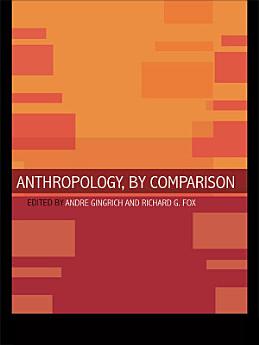Anthropology, by Comparison
Richard G. Fox · Andre Gingrich
ছেপ্তে ২০০২ · Routledge
ইবুক
288
পৃষ্ঠা
family_home
যোগ্য
info
reportমূল্যাংকন আৰু পৰ্যালোচনা সত্যাপন কৰা হোৱা নাই অধিক জানক
এই ইবুকখনৰ বিষয়ে
Comparison has long been the backbone of the discipline of anthropology. But recent developments in anthropology, including critical self-reflection and new case studies sited in a globalized world, have pushed comparative work aside. For the most part, comparison as theory and method has been a casualty of the critique of 'grand theory' and of a growing mistrust of objectivist, hard-science methodology in the social sciences.
Today it is time for anthropology to resume its central task of exploring humankind through comparison, using its newfound critical self-awareness under changing global conditions. In Anthropology By Comparision, an international group of prominent anthropologists re-visits, re-theorizes and re-invigorates comparison as a legitimate and fruitful enterprise. The authors explore the value of anthropological comparison and encourage an international dialogue about comparative research. While rejecting older, universalist comparative methods, these scholars take a fresh look at various subaltern and neglected approaches to comparison from their own national traditions. They then present new approaches that are especially relevant to the globalized world of the twenty-first century.
Every student and practitioner of anthropology and the social sciences will find this thought-provoking volume essential reading. Anthropology, by Comparison is a call to creative reflection on the past and productive action in the present, a challenge to anthropologists to revitalize their unique contribution to human understanding. Anthropology, by Comparison is an indispensable overview of anthropology's roots - and its future - with regard to the comparative study of humankind.
Today it is time for anthropology to resume its central task of exploring humankind through comparison, using its newfound critical self-awareness under changing global conditions. In Anthropology By Comparision, an international group of prominent anthropologists re-visits, re-theorizes and re-invigorates comparison as a legitimate and fruitful enterprise. The authors explore the value of anthropological comparison and encourage an international dialogue about comparative research. While rejecting older, universalist comparative methods, these scholars take a fresh look at various subaltern and neglected approaches to comparison from their own national traditions. They then present new approaches that are especially relevant to the globalized world of the twenty-first century.
Every student and practitioner of anthropology and the social sciences will find this thought-provoking volume essential reading. Anthropology, by Comparison is a call to creative reflection on the past and productive action in the present, a challenge to anthropologists to revitalize their unique contribution to human understanding. Anthropology, by Comparison is an indispensable overview of anthropology's roots - and its future - with regard to the comparative study of humankind.
এই ইবুকখনক মূল্যাংকন কৰক
আমাক আপোনাৰ মতামত জনাওক।
পঢ়াৰ নির্দেশাৱলী
স্মাৰ্টফ’ন আৰু টেবলেট
Android আৰু iPad/iPhoneৰ বাবে Google Play Books এপটো ইনষ্টল কৰক। ই স্বয়ংক্রিয়ভাৱে আপোনাৰ একাউণ্টৰ সৈতে ছিংক হয় আৰু আপুনি য'তে নাথাকক ত'তেই কোনো অডিঅ'বুক অনলাইন বা অফলাইনত শুনিবলৈ সুবিধা দিয়ে।
লেপটপ আৰু কম্পিউটাৰ
আপুনি কম্পিউটাৰৰ ৱেব ব্রাউজাৰ ব্যৱহাৰ কৰি Google Playত কিনা অডিঅ'বুকসমূহ শুনিব পাৰে।
ই-ৰীডাৰ আৰু অন্য ডিভাইচ
Kobo eReadersৰ দৰে ই-চিয়াঁহীৰ ডিভাইচসমূহত পঢ়িবলৈ, আপুনি এটা ফাইল ডাউনল’ড কৰি সেইটো আপোনাৰ ডিভাইচলৈ স্থানান্তৰণ কৰিব লাগিব। সমৰ্থিত ই-ৰিডাৰলৈ ফাইলটো কেনেকৈ স্থানান্তৰ কৰিব জানিবলৈ সহায় কেন্দ্ৰত থকা সবিশেষ নিৰ্দেশাৱলী চাওক।







